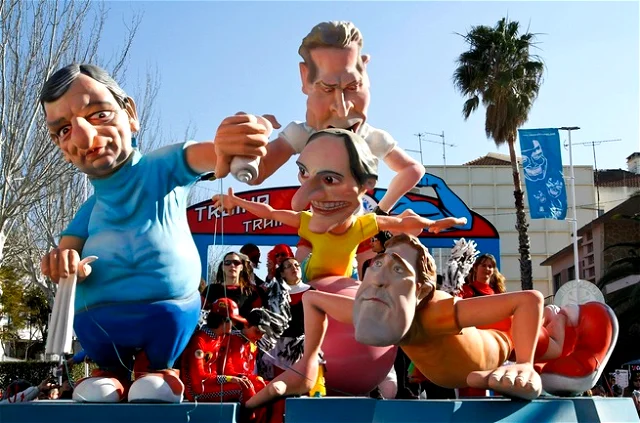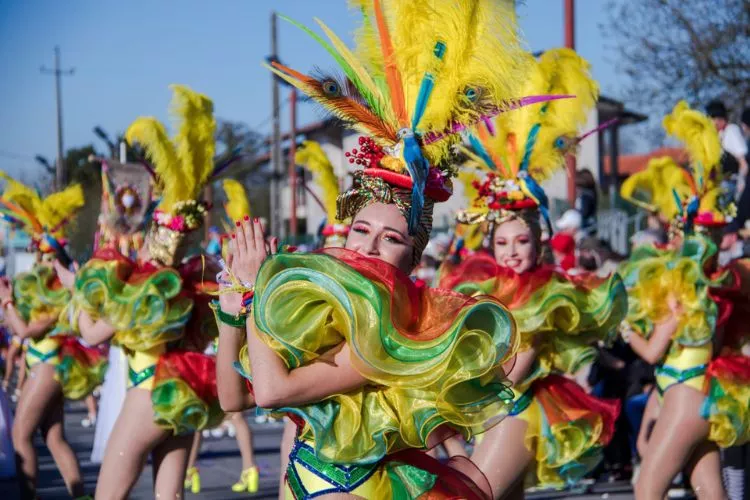Carnival 2025 in Portugal: Guide to March Parades
- Pedro Ferreira
- Aug 31, 2024
- 5 min read
Updated: Feb 23

Carnival, known as "Entrudo" in Portugal, is an ancient tradition that celebrates the arrival of spring. The term "Entrudo" means "entrance" and refers to festivities marking the beginning of Lent in the Christian calendar. Historically, it involved spontaneous street celebrations where people threw water and eggs at each other.
Today, Carnival in Portugal features parades, samba dancers, costumed participants, masquerade balls, and lively music from north to south, resembling Brazilian Carnival in some ways but on a smaller scale. In this post, explore Carnival celebrations in different cities in Portugal on March 4. 2025. The following cities have the main celebrations: Ovar, Podence, Torres Vedras, Sesimbra, Loulé’, Lisbon and Porto.
Carnival as a Non-Holiday
Unlike Brazil, Carnival Tuesday is not an official public holiday in Portugal, meaning schools and businesses remain open. Festivities typically occur in the evenings and on the weekend leading up to Ash Wednesday, making it a more condensed celebration compared to the week-long events in Brazil.
Weather During Carnival
Held at the start of spring, Carnival in Portugal is often chilly, with temperaturesranges from 11°C (52°F) to 22°C (72°F). Despite the chill weather, you will still see energetic samba dancers and vibrant costumes in the parades.
Key Carnival Dates
Carnival dates in Portugal vary each year, aligning with the Catholic Church's liturgical calendar. In 2025, Carnival falls on the 4th of March. Celebrations primarily occur in the days leading up to this date, especially on "Fat Sunday."
The Carnival in Ovar in 2025 is celebrated from the 8th of February to the 4th of March.
The Carnival in Porto will be celebrated from March 1 to 4, 2025.
In Torres Verdes the carnival will be from the 28th of February to 5th of March
The carnival in Loule will be from March 1st to 4th.
Join Lisbon's festivities from February 2nd to 15th, 2025
Notable Carnival Celebrations in Portugal
1. Ovar’s Carnival: Located in the District of Aveiro, Ovar's Carnival is one of Portugal's most famous, known for its vibrant parades featuring samba schools and elaborate floats. The event, which began in 1952, draws thousands of visitors each year and plays a significant cultural and economic role in the region.
Visit the Museu de Ovar: Explore the Museu de Ovar to learn about the city’s history, culture, and traditional Carnival celebrations, including exhibits on the famous papier-mâché floats and costumes.
Explore the Ria de Aveiro: Enjoy nature activities such as bird watching, kayaking, or boat tours in the nearby Ria de Aveiro, a beautiful coastal lagoon known for its stunning landscapes and diverse wildlife.
2. Podence’s Traditional Carnival: In the Trás-os-Montes region, the small town of Podence hosts a unique Carnival known for its "Caretos"—masked boys wearing colorful costumes and rattles. Declared Intangible Cultural Heritage by UNESCO, this festival is known for its noisy, playful atmosphere, with Caretos running through the streets creating chaos and fun.
Experience Traditional Masked Dances: Attend a traditional masked dance during Carnival, where you can see the unique Caretos costumes and watch local dancers perform lively, energetic routines.
Explore the Montesinho Natural Park: Take a guided tour or hike in the Montesinho Natural Park, located near Podence, to experience the stunning natural scenery and learn about the region’s unique flora and fauna.
Podence Masks
3. Torres Vedras’ Authentic Carnival: Celebrated as the "most Portuguese" Carnival, Torres Vedras' festivities remain true to the traditional Entrudo customs. This century-old event features floats, political satire, and traditional figures like "matrafonas" (men dressed as women) and "cabeçudos" (large-headed puppets), capturing the local culture.
Visit the Torres Vedras Castle: Explore the historic Torres Vedras Castle, offering panoramic views of the town and countryside and a glimpse into Portugal’s medieval past.
Tour Local Vineyards and Wineries: Join a wine-tasting tour in the surrounding region, known for its high-quality wines. Enjoy sampling local varieties and learning about the wine production process from local experts.
4. Sesimbra’s Unique Celebrations: Sesimbra, located by the sea, hosts two Carnivals annually—one in March and another in summer. March's Carnival features samba school parades, costume contests, and a massive Clown Parade, while the summer celebration also includes Brazilian music and dances.
Go Scuba Diving or Snorkeling: Sesimbra is a popular spot for scuba diving and snorkeling, thanks to its clear waters and diverse marine life. Visitors can take a guided tour or rent equipment to explore the underwater world.
Visit the Cabo Espichel: Explore Cabo Espichel, a dramatic cape with stunning views of the Atlantic Ocean. It’s also home to the 18th-century Sanctuary of Nossa Senhora da Pedra Mua, offering a glimpse into the area’s religious history.
5. Loulé’s Algarve Carnival: In the Algarve, the city of Loulé is known for its vibrant Carnival, featuring floats, samba groups, and street performers. This century-old celebration attracts thousands of visitors, blending traditional Portuguese festivities with a festive, beachside atmosphere.
Carnival Celebrations in Major Cities
Lisbon: The capital's Carnival features a mix of traditional Portuguese elements and Brazilian-style celebrations. Events include parades, blocos, and music from various genres, catering to diverse tastes.
Attend a Fado Show: Experience a traditional Fado show, Portugal’s soulful music genre, in one of Lisbon’s famous Fado houses. This unique cultural experience is a must for understanding the country’s music and history.
Take a Walking Tour of Alfama: Join a guided walking tour of Alfama, Lisbon’s oldest district, to explore its narrow, winding streets, historic architecture, and local landmarks, providing a glimpse into the city’s rich cultural heritage.
Porto: Portugal's second-largest city also enjoys lively Carnival celebrations with street parades, music concerts, art workshops, and themed parties, offering a festive atmosphere throughout the city.
Take a Douro River Cruise: Enjoy a scenic cruise along the Douro River, which offers breathtaking views of Porto’s historic waterfront and famous bridges, as well as the surrounding wine country.
Visit the Port Wine Cellars: Tour the famous Port wine cellars in Vila Nova de Gaia, just across the river from Porto, to learn about the production process of Portugal’s renowned fortified wine and sample different varieties.
Brazilian-Style Carnivals in Portugal
With a growing Brazilian community in cities like Lisbon and Porto, Brazil's influence is evident in many Portuguese Carnival celebrations. These events often include samba, frevo, and axé music, with themes celebrating diversity and Brazilian culture. Notable examples include Lisbon's vibrant Carnival balls and street blocos, such as Lisbloco, which emphasizes environmental awareness through Brazilian rhythms and dance.
Carnival in Portugal, while distinct from its Brazilian counterpart, offers a rich tapestry of cultural expressions, combining traditional elements with vibrant, modern celebrations that showcase the country's diverse heritage.
.png)












































































